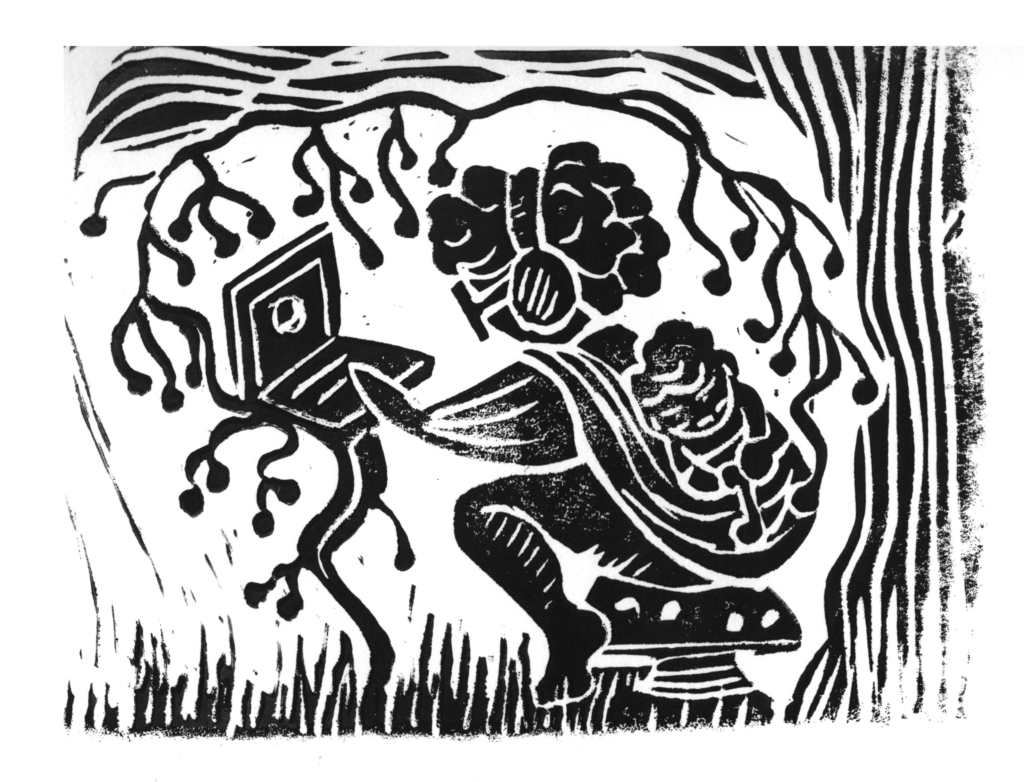
On October 25th, 2023, the book Higher Education for Good: Teaching and Learning Futures was published. The book is an open-access collection of work by 70+ authors in 18 countries, edited by Laura Czerniewicz and me (further details about the book can be found here). The book’s starting point is that higher education is in crisis and it answers the question “What can be done”?
This blog post describes two book launches held recently: one virtual, one physical.
Online book launch
In the online book launch in November 2023, many of the book’s community of authors, artists and editors, as well as the publisher, joined together to celebrate publication and to share the experience of creating the book openly with readers and potential readers. The overwhelming feedback shared by authors during the launch was their deep valuing of the critical but caring feedback received from peer reviewers, external reviewers, and the book’s editors. Many authors described how proud they are of the final results; some of their comments include: “our chapter is the definitive record of our project”; “reviewers asked me to find the hope — and I did”; “the experience has been life changing”.
We are grateful to Equity Unbound for hosting the online launch, and also for their offer to host further webinars focused on specific chapters. We are currently planning these events for later in 2024 — please stay tuned (via the hashtag #HE4Good).
In-person book launch in Galway
In addition to the online event, an in-person book launch was hosted by the University of Galway (Ireland) on 11 December 2023. This was an opportunity not only to share the book, but also to encourage deeper discussions about higher education for good within a local HE community. The speakers for the book launch included three contributors to the book —author Su-Ming Khoo (University of Galway), author Kate Molloy (Atlantic Technological University, Ireland), and myself (HE4Good co-editor)— as well as a critical reader of the book, Duduzile Unathi Ndlovu (PhD scholar, University of Galway).
About one hour before the launch, we learned that a general one-day strike had been called for that day, as part of wider efforts calling for a ceasefire in Gaza. As a long-time activist, Duduzile expressed her intention to participate in the strike. Instead of going ahead with the launch as planned, we decided to reframe the launch programme to acknowledge the strike, and also to enable Duduzile to add her contribution in writing on a later date. What transpired was a powerful event.
Catherine welcomed participants and highlighted the rationale for Higher Education for Good, i.e. the urgent need to recognise multiple, interconnected global and HE crises, including the feelings of despair these can provoke. Rather than ignoring these crises, the book’s authors and artists show that they can and must be named and analysed, and can thus provide greater impetus for our work towards justice in higher education and beyond (presentation slides here).
Su-Ming, instead of speaking about her book chapter, read aloud (in English and Malay) the poem If I Must Die by Refaat Alareer – Palestinian writer, poet, professor and activist, who had been killed in Gaza five days previously. Su-Ming’s reading provided a powerful moment of reflection and recognition for all present; in Refaat Alareer’s words, “let it be a tale”.
Kate introduced the two chapters she co-authored in Higher Education for Good, focusing particularly on her chapter written with Clare Thomson ‘Humanising learning design with digital pragmatism’, which draws on adrienne marie brown’s Emergent Strategy work. As Kate explained, intentionally drawing on the tenets of emergent strategy can help learning designers and academics, working in trusting collaborations with one another and with students, to work towards transformative justice and systemic change.
Duduzile, as noted, did not speak at the launch but shared her written response to the book afterward, based on a critical reading of several chapters. We include an excerpt below but encourage you to read the full piece, which is available here:
Unlike most of these contributors, I’ve been doing this work of critically understanding and contesting HE from within as nobody’s professor or cited authority. That said, I really have been at it for years and feel like I can join those more qualified and experienced than I am in sharing, with some authority, what it involves. And, in chorus with some of the sentiments shared in the text, I have found being in the university and contesting higher education both as challenging, necessary, and sometimes rewarding, but mostly, impossible, exhausting, lonely and hopeless work. And so another of this publication’s draws for me is how it intentionally, and in my opinion, successfully, is an offering of hope for those committed to the radical and decolonial idea of what it puts forward as HE4Good. In this way, it indeed acknowledges and affirms the despair and need for hope that I have known and have experienced doing my little bit for the cause of HE4Good. In this, I say, is [the] book’s ultimate value.
Following the short presentations at the Galway book launch, deep discussions were held with the 25 or so people in attendance, many of whom stayed after the event to continue talking together. We very much hope that this will not be the last event like this, where people are able to gather and have deep discussions catalysed by the book and its intersection with broader social issues.
We are partnering with many of the book’s authors to participate in similar events —both online and in-person— so that the ideas within HE4Good can be explored, discussed and debated, and also might help to inform and inspire ongoing and new work towards creating higher education for good.
If you would like to organise such an event, please get in touch.
Image: Vessels of Hope by Giulia Forsythe (CC0), image from Higher Education for Good